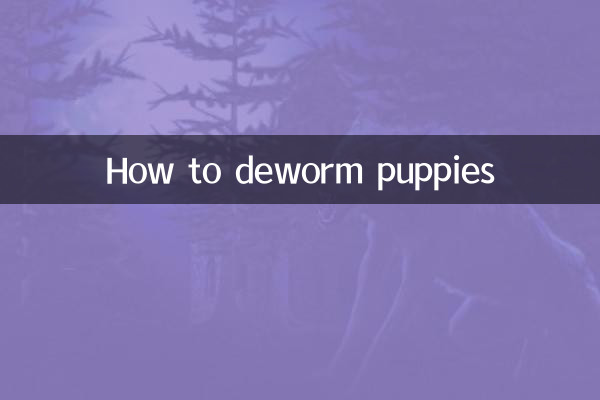How to deworm puppies? Comprehensive guide and hot spot analysis
Recently, pet health topics have become increasingly popular on social platforms, especially the issue of deworming puppies, which has become the focus of novice pet owners. This article combines popular discussions on the Internet in the past 10 days to compile a scientific and practical guide to deworming puppies to help you protect the health of your dog.
1. Why do puppies need to be dewormed regularly?

Puppies have weak immune systems and are susceptible to parasites. Data shows that the infection rate of undewormed puppies is as high as 60%-80%, which may cause diarrhea, anemia and even death. The following are common parasite types and their dangers:
| Parasite type | route of infection | Main hazards |
|---|---|---|
| roundworm | Maternally transmitted/environmental infection | Malnutrition, intestinal obstruction |
| tapeworm | Flea borne/raw meat infestation | weight loss, anal itching |
| hookworm | Skin penetration/oral infection | anemia, bloody stools |
2. Deworming schedule and drug selection
According to the recommendations of pet doctors, puppy deworming should follow the following scientific cycle:
| puppy age | Frequency of deworming | Recommended drug types |
|---|---|---|
| 2-4 weeks old | First time deworming | Special puppy drops |
| 2-6 months old | 1 time per month | Broad spectrum anthelmintics |
| After 6 months of age | Once every 3 months | Deworming medicine for adult dogs |
3. Comparison of popular deworming methods
In recent discussions, three deworming methods have received the most attention:
| method | Advantages | Things to note |
|---|---|---|
| Oral tablets | Long-lasting effect and easy to use | Accurate dosage based on body weight is required |
| external drops | Anti-fleas and ticks | Avoid bathing for 48 hours |
| Insect repellent collar | Long lasting protection | May cause skin allergies |
4. Top 5 common questions about deworming (recent hot searches)
1.What should I do if I have diarrhea after deworming?It is a normal drug reaction and can be treated with probiotics. If it lasts for more than 2 days, you need to seek medical treatment.
2.Which should be done first, vaccination or deworming?It is recommended to pre-worm the virus and vaccinate again after an interval of 1 week.
3.Symptoms of anthelmintic poisoning?Vomiting, convulsions, etc. require immediate medical attention and gastric lavage.
4.Can I use human anthelmintics?Absolutely prohibited! Differences in dosage can easily lead to poisoning.
5.Do I need to fast after deworming?Usually not required, but some medicines require taking them on an empty stomach.
5. 5 life details to prevent parasites
1. Clean the kennel and food utensils regularly
2. Avoid contact with other animal feces
3. Avoid staying in grass for a long time when going out
4. Bath no more than 3 times a month
5. Keep the environment dry and ventilated
Warm reminder:Recently, there have been complaints about "fake anthelmintic drugs" in many places. It is recommended to purchase them through regular pet hospitals and scan the anti-counterfeiting code of the drug for verification. If you find that your puppy is abnormally thin or has worms in its feces, you should immediately conduct a fecal examination and consult a professional veterinarian.
Through scientific deworming and daily protection, your dog will stay away from the threat of parasites and grow up healthily. It is recommended to collect this article and share it with other dog-raising families to jointly improve pet health awareness!

check the details

check the details